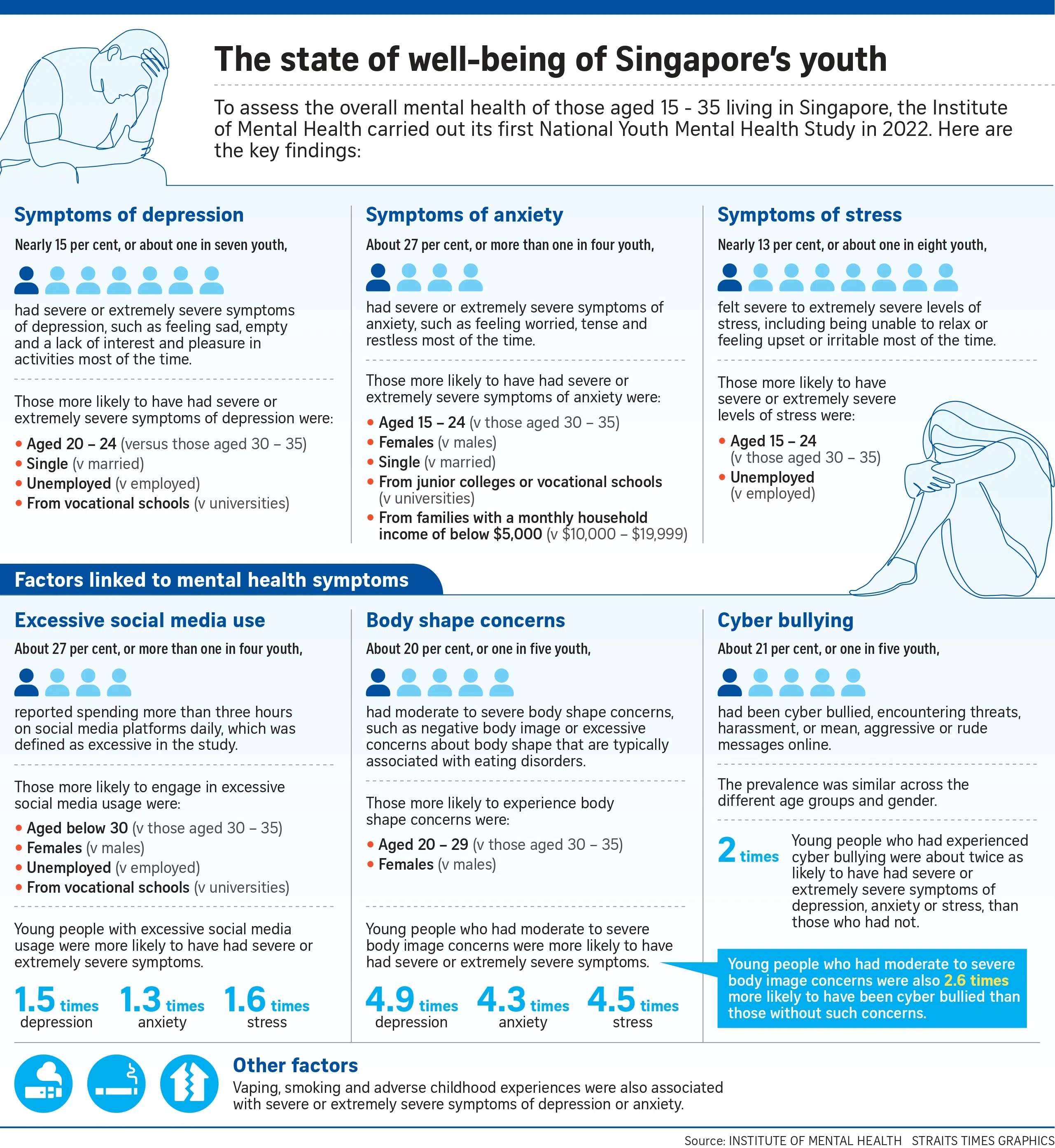Key takeaways from IMH’s National Youth Mental Health study
Sign up now: Get ST's newsletters delivered to your inbox

About 27 per cent, or around one in four youth, reported spending more than three hours on social media platforms daily.
PHOTO: ST FILE
SINGAPORE - To assess the overall mental health of Singapore residents aged 15 to 35, the Institute of Mental Health carried out its first National Youth Mental Health Study
Here are the key takeaways of its results, which were released on Sept 19:
Anxiety was the most common mental health problem experienced by young people in Singapore. More than one in four youth (about 27 per cent) had severe or extremely severe symptoms of anxiety, such as feeling worried, tense and restless, most of the time.
Around one in seven (nearly 15 per cent) felt severe to extremely severe levels of depression, including feeling sad, empty and a lack of interest and pleasure in activities, most of the time.
Around one in eight (nearly 13 per cent) felt severe to extremely severe levels of stress, including being unable to relax or feeling upset or irritable, most of the time.
More than one in four (27 per cent) use social media excessively – which is more than three hours a day, as defined by the study. Those under the age of 30 and females were more likely to do so. Young people with excessive social media usage were 1.6 times more likely to be severely stressed, and 1½ times more likely to have severe symptoms of depression.
Around one in five (20.2 per cent) have moderate to severe body shape concerns, such as excessive concerns about body shape that are typically associated with eating disorders. Those aged 20 to 29 and females are more likely to experience such concerns. Young people with such concerns are 4.9 times more likely to have severe symptoms of depression.
Around one in five youth (21 per cent) had been cyber bullied through receiving mean, aggressive or rude messages online. Young people who had experienced cyber bullying were about twice as likely to have had severe or extremely severe symptoms of depression, anxiety or stress, compared with those who had not.
Apart from excessive social media use, body shape concerns and cyber bullying, other factors such as vaping, smoking and adverse childhood experiences were also found to be associated with severe or extremely severe symptoms of depression or anxiety.
One in three youth (30.9 per cent) did not seek help, despite having severe or extremely severe symptoms.
Those who did not seek help thought that specialists would not be able to help them, were worried about what other people may think, and were worried about issues of privacy, confidentiality or being left with a permanent record.

Helplines
Mental well-being
Institute of Mental Health’s Mental Health Helpline: 6389-2222 (24 hours)
Samaritans of Singapore: 1-767 (24 hours) / 9151-1767 (24-hour CareText via WhatsApp)
Singapore Association for Mental Health: 1800-283-7019
Silver Ribbon Singapore: 6386-1928
Tinkle Friend: 1800-274-4788
Chat, Centre of Excellence for Youth Mental Health: 6493-6500/1
Women’s Helpline (Aware): 1800-777-5555 (weekdays, 10am to 6pm)
Counselling
Touchline (Counselling): 1800-377-2252
Touch Care Line (for caregivers): 6804-6555
Care Corner Counselling Centre: 6353-1180
Counselling and Care Centre: 6536-6366
We Care Community Services: 3165-8017
Online resources
carey.carecorner.org.sg
(for those aged 13 to 25)limitless.sg/talk
(for those aged 12 to 25)



